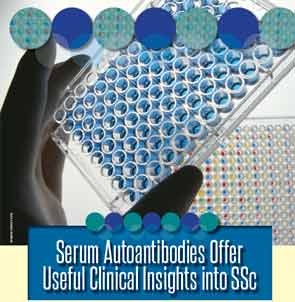
Autoantibodies’ Links with Clinical Conditions
The autoantibodies found to be clearly linked to SSc all have fairly well-defined links with associated medical conditions. Here is an overview of those links and the type of SSc with which they are typically associated:
Found mainly in diffuse systemic sclerosis
Anti-topoisomerase I (-Scl-70): interstitial lung disease (ILD)
Anti-RNA polymerase III: severe skin involvement, increased risk of renal crisis
Anti-U3RNP: myopathy, cardiomyopathy, pulmonary arterial hypertension (PAH)
Found mainly in limited SSc
Anti-centromere: PAH
Anti-Th/To: PAH, ILD
Overlap between diffuse and limited SSc
Anti-U1RNP: myositis, ILD
Anti-PM-Scl: myositis
Anti-Ku: myositis
Anti-U11/U12RNP: ILD
Source: Thomas Medsger, Jr., MD, University of Pittsburgh
WASHINGTON, D.C.—Improved understanding of the role of autoantibodies as “guides” in systemic sclerosis (SSc) could have direct effects on the care of patients in the clinic, an expert said in a session titled, “Serum Autoantibodies in Systemic Sclerosis: Usefulness in Diagnosis, Clinical Subsetting, and Predicting Outcomes,” at the 2012 ACR/ARHP Annual Meeting, held here November 9–14. [Editor’s Note: This session was recorded and is available via ACR SessionSelect at www.rheumatology.org.]
Autoantibodies offer insights into whether patients might acquire the disease before they show symptoms and in predicting the kinds of complications that might arise in a patient.
“They’re helpful in diagnosis,” said Thomas Medsger, Jr., MD, director of the Scleroderma Research Program at the University of Pittsburgh, in his Klemperer Memorial Lecture. “They’re helpful in the clinical setting. They’re helpful in predicting the natural history of disease and survival. And, they can inform the design of future clinical and laboratory studies and clinical trials.”
The University of Pittsburgh has amassed a treasure trove of information about autoantibodies in its Scleroderma Databank and Serumbank, a project supported by the university, the National Institutes of Health, private foundations, and gifts from grateful patients. The project has logged information on 4,100 patients since 1972. Researchers gathered data at first and follow-up visits, collecting clinical, laboratory, and serologic data.
Nine Autoantibodies Associated with SSc
The list of SSc-associated autoantibodies has grown steadily since the 1970s, and there are now nine that are most clearly associated with systemic sclerosis: anti-Ku, anti-U3RNP, anti-U1RNP, anti-Th/To, anti-topoisomerase I (topo I), anti-centromere, anti-U11/U12RNP, anti-RNA polymerase III, and anti-PM-Scl.
“One question is, how specific are they for SSc?” Dr. Medsger said. “There are certainly exceptions.” Anti-centromere occurs in some patients with Raynaud’s disease, Sjögrens syndrome, and lupus. Anti-Th/To also can be found in patients with Raynaud’s. Anti-PM-Scl can be detected in patients with Raynaud’s and polymyositis and dermatomyositis (PM/DM). Anti-Ku can be found in some with lupus or PM/DM. And anti-U1RNP is found in many lupus patients and some PM/DM patients. The others are almost 100% specific.
